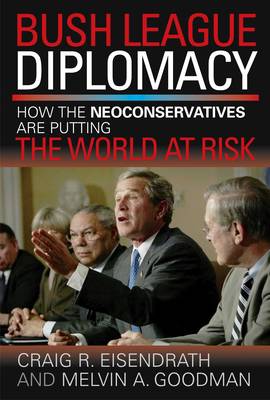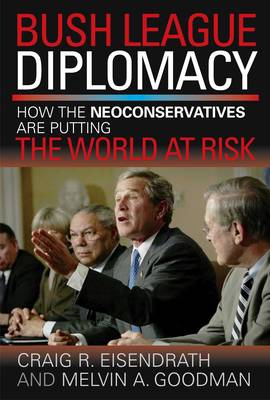
Bedankt voor het vertrouwen het afgelopen jaar! Om jou te bedanken bieden we GRATIS verzending (in België) aan op alles gedurende de hele maand januari.
- Afhalen na 1 uur in een winkel met voorraad
- In januari gratis thuislevering in België
- Ruim aanbod met 7 miljoen producten
Bedankt voor het vertrouwen het afgelopen jaar! Om jou te bedanken bieden we GRATIS verzending (in België) aan op alles gedurende de hele maand januari.
- Afhalen na 1 uur in een winkel met voorraad
- In januari gratis thuislevering in België
- Ruim aanbod met 7 miljoen producten
Zoeken
Bush League Diplomacy
How the Neoconservatives Are Putting the World at Risk
James M Humber, Melvin A Goodman
Hardcover | Engels
€ 43,45
+ 86 punten
Omschrijving
Fifty years ago, the United States founded the United Nations, promoted the Universal Declaration of Human Rights, used economic aid as a tool for creating stability, and viewed collective agreements and cooperation as the principal methods of sharing the costs and the risks of security. Today, under the leadership of George W. Bush, the main tool of foreign policy is military force, not diplomacy. America is going it alone, and paying the price, both abroad and at home, for the reckless endangerment of both national and international security.
In this comprehensive critique of the Bush administration's handling of international relations, Craig R. Eisendrath and Melvin A. Goodman, both senior fellows at the Center for International Policy, demonstrate the folly and the dangers of abandoning diplomacy and relying on military force as the chief means of conducting U.S. foreign policy. The authors argue that a policy of bullying will sow seeds of resentment and mistrust among our potential allies and encourage nations hostile to our interests to seek nuclear and other weapons of mass destruction as a last-resort method of protecting themselves against a belligerent world power. Eisendrath and Goodman foresee the international community becoming dangerously unstable, not more secure, under a Pax Americana maintained by military might.
On the domestic front, the authors warn that a policy emphasizing the power of the executive branch at the expense of Congress, and suspending long-standing civil rights under the pretext of national security, threatens the Constitution. Finally, the decline of government services for education, health, and the elderly, and the economic effect of huge military expenditures financed by deficit spending are already causing distress in large parts of our society.
This trenchant critique by two experienced foreign policy analysts will serve as a wake-up call to the dangerous militarism at the heart of the Bush agenda.
In this comprehensive critique of the Bush administration's handling of international relations, Craig R. Eisendrath and Melvin A. Goodman, both senior fellows at the Center for International Policy, demonstrate the folly and the dangers of abandoning diplomacy and relying on military force as the chief means of conducting U.S. foreign policy. The authors argue that a policy of bullying will sow seeds of resentment and mistrust among our potential allies and encourage nations hostile to our interests to seek nuclear and other weapons of mass destruction as a last-resort method of protecting themselves against a belligerent world power. Eisendrath and Goodman foresee the international community becoming dangerously unstable, not more secure, under a Pax Americana maintained by military might.
On the domestic front, the authors warn that a policy emphasizing the power of the executive branch at the expense of Congress, and suspending long-standing civil rights under the pretext of national security, threatens the Constitution. Finally, the decline of government services for education, health, and the elderly, and the economic effect of huge military expenditures financed by deficit spending are already causing distress in large parts of our society.
This trenchant critique by two experienced foreign policy analysts will serve as a wake-up call to the dangerous militarism at the heart of the Bush agenda.
Specificaties
Betrokkenen
- Auteur(s):
- Uitgeverij:
Inhoud
- Aantal bladzijden:
- 268
- Taal:
- Engels
Eigenschappen
- Productcode (EAN):
- 9781591021766
- Verschijningsdatum:
- 1/03/2004
- Uitvoering:
- Hardcover
- Formaat:
- Genaaid
- Afmetingen:
- 161 mm x 231 mm
- Gewicht:
- 508 g

Alleen bij Standaard Boekhandel
+ 86 punten op je klantenkaart van Standaard Boekhandel
Beoordelingen
We publiceren alleen reviews die voldoen aan de voorwaarden voor reviews. Bekijk onze voorwaarden voor reviews.









